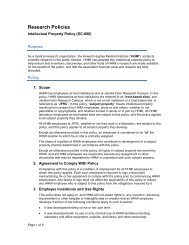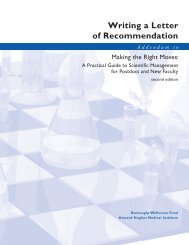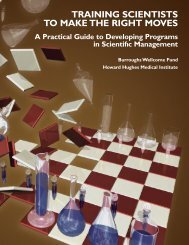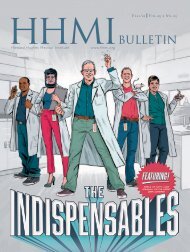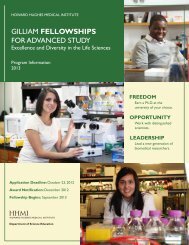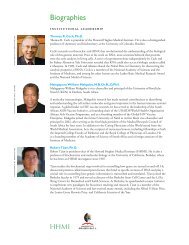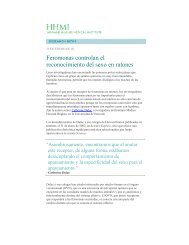Download PDF - Howard Hughes Medical Institute
Download PDF - Howard Hughes Medical Institute
Download PDF - Howard Hughes Medical Institute
Create successful ePaper yourself
Turn your PDF publications into a flip-book with our unique Google optimized e-Paper software.
Jeffrey Kieft has always been willing to step out of his comfort zone<br />
to make a difference. The HHMI early career scientist attended<br />
West Point and served as an army tank platoon leader in Mannheim,<br />
Germany. Then he worked as a policy fellow at the White House.<br />
Now, in addition to running his University of Colorado lab,<br />
he engages church groups on the theory of evolution. He’s driven<br />
to advocate for science.<br />
I think the scientific community has to be careful that we<br />
don’t adopt the attitude that science belongs to scientists.<br />
We need the public to see some connection to their lives.<br />
The discoveries that we make really do belong to everyone<br />
and should be communicated. I don’t see this as service outside<br />
of my job but rather integral to the job.<br />
When I started as an army officer, I naively thought my<br />
goals matched those of all of my subordinates. I learned that<br />
everyone is motivated by different things. Motivating diverse<br />
people became a challenge I enjoy—in the lab and when I<br />
speak with the public.<br />
During a AAAS policy fellowship in the White House<br />
Office of Science and Technology Policy, I got a bird’s eye<br />
view of science. I saw that the public and policymakers don’t<br />
necessarily understand how science works. Many don’t see<br />
it as an investment in the future. That experience made me<br />
eager to speak at places such as church forums, Cafe Scientifiques,<br />
and community colleges. For me, talking to the public<br />
satisfies that itch to get science’s voice out there. When I read<br />
something in the newspaper or hear something that is an<br />
obvious misunderstanding or misstatement about science, I<br />
can’t not do something about it.<br />
But I don’t get confrontational. When speaking to a church<br />
group, for example, I don’t gear myself up for a debate. My<br />
goal is to find some common ground and move the discussion<br />
forward. I say, let’s examine evolution and see if it really must<br />
conflict with religion. I cover the basic tenets of evolutionary<br />
theory and, even more importantly, what evolution is not. I’ve<br />
been asked, “Isn’t the first rule of evolution that there is no<br />
God?” I reply, “Well, no actually, that isn’t in any science textbook.”<br />
Just teaching these basic concepts puts people more<br />
at ease because they’ve never learned what evolution means.<br />
To explain a concept like natural selection, I start with a<br />
story that everyone can understand. Imagine a valley where<br />
rabbits live with few predators. Then wolves move in and that<br />
pressure selects for survival and reproductive success of rabbits<br />
with certain genes, such as those that make them faster. Over<br />
time the rabbit population adapts to become better at evading<br />
wolves. If you understand that, then you understand a key<br />
part of what Darwin proposed.<br />
People also love hearing about vestigial structures—for<br />
instance, the fact that when you get scared, your hair stands<br />
on end. That’s a vestige of our ability to puff up and look<br />
bigger—that is, if we still had fur. We are still carrying in our<br />
bodies evidence of our lineage.<br />
I never serve up a watered-down version of evolution, and<br />
I am clear that intelligent design is not science and is logically<br />
flawed. But I show people than none of this requires them to<br />
give up their faith. Evolution is a ‘How did it happen?’ story,<br />
not a ‘Who dunnit?’<br />
I respect the view of a friend who is a pastor in Iowa. He<br />
says his faith is enhanced by a God clever enough to think up<br />
evolution. Some people are not placated, but if they go home<br />
and think about it or talk about it around the dinner table,<br />
then I’ve had a positive influence.<br />
And sometimes people ask questions that send me home<br />
thinking. Once, a woman asked, “If we are all evolved from<br />
common ancestors, us and gorillas and fruit flies, and I believe<br />
that humans have a soul, then when did the soul evolve?” I<br />
gave her the standard answer that science could not answer<br />
that. She replied, “But if my faith says I have a soul and the<br />
fruit fly doesn’t, and if we both came from the same thing biologically,<br />
how is that not in conflict?” That made me realize<br />
that, for some people, it is really hard to separate evolutionary<br />
theory from their faith.<br />
But, even with this challenge, if we as scientists don’t<br />
step out and say something—even in little bits and pieces<br />
and in small forums—then we’re shooting ourselves in the<br />
foot because the misinformation and antiscience voices<br />
win by default.<br />
INTERVIEW BY KENDALL POWELL. Jeffrey Kieft studies<br />
RNA structural biology at the University of Colorado Denver<br />
School of Medicine.<br />
February 2o12 | HHMI BULLETIN<br />
35




